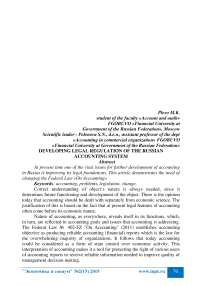Developing legal regulation of the Russian accounting system
Автор: Plevo M.K.
Журнал: Экономика и социум @ekonomika-socium
Статья в выпуске: 2-1 (15), 2015 года.
Бесплатный доступ
At present time one of the vital issues for further development of accounting in Russia is improving its legal foundations. This article demonstrates the need of changing the Federal Law «On Accounting»
Accounting, problems, legislation, change
Короткий адрес: https://sciup.org/140111997
IDR: 140111997
Текст научной статьи Developing legal regulation of the Russian accounting system
Correct understanding of object’s nature is always needed, since it determines future functioning and development of the object. There is the opinion today that accounting should be dealt with separately from economic science. The justification of this is based on the fact that at present legal features of accounting often come before its economic nature.
Nature of accounting, as everywhere, reveals itself in its functions, which, in turn, are reflected in accounting goals and issues that accounting is addressing. The Federal Law № 402-FZ "On Accounting" (2011) establishes accounting objective as producing reliable accounting (financial) reports which is the law for the overwhelming majority of organizations. It follows that today accounting could be considered as a form of state control over economic activity. This interpretation of accounting makes it a tool for protecting the right of various users of accounting reports to receive reliable information needed to improve quality of management decision making.
Comparative analysis of new and old accounting legislation shows that the Federal Law "On Accounting" № 129-FZ (1996) (now void) gave more broad and precise definition of accounting objectives than its newest version № 402-FZ.
Of special importance is the fact that in the Law of 1996, alongside with listing the requests to full and reliable financial information, answering to the needs of various users, one of accounting objectives has been recognized as prevention of detrimental results of economic activities and revealing inner reserves for ensuring financial stability [2, p. 1]. These objectives pinpointed the economic nature of accounting, which is implied by its inherent relationship with the analysis of economic activity of an enterprise and its own due diligence.
To understand the economic nature of today accounting and the foundation of its objectives analysis both of its legal and methodological aspects appears helpful. Of main importance for accounting as a specific type of economic activity is the accounting balance, showing interdependence between three major indexes of economic activity, namely: capital, assets and obligations. There are two main interpretations of balance equality, being the cornerstones of two world schools of accounting, arising in the beginning of past century. Different approaches to balance equality lead to differing formulations of accounting objectives. The above accounting schools are:
-«personified» school;
-«institutional» school.
Representatives of the personified school gave most importance to the assets. The Balance equality within the framework of given approach is:
Assets= Capital + Obligation.
Concentrating on the assets, this school asserted that all liabilities are just debt obligations. Thus the own capital of the company becomes a debt to the owner. Therefore the major accounting objective in this framework is the increase in financing which implies facilitating the transformation of various assets into cash, i.e. Increase of company solvency.
In its turn, the institutional school offers another model of balance equality:
Capital = Assets - Obligation.
The Main postulate here is that own capital becomes the base for company functioning and developing providing its financial stability [3, p. 295]. Adherents of these theories share the opinion that preservation and increase of company capital is the major accounting objective.
Combining these two approaches allows asserting that the main accounting objectives linked to its economic nature are:
-
1. increasing solvency which presumes preventing unwanted consequences of economic actions;
-
2. increasing own capital in companies. Here the capital should be considered as the main company resource providing its financial stability .
Therefore it seems pertinent to introduce to the existing version of the Federal Law "On Accounting" № 402-FZ the following accounting objectives:
-
1. ensuring completeness and validity of account and report data;
-
2. preventing unwanted consequences from company economic actions;
-
3. discovering inner resources to enhance financial stability.
-
2. Федеральный закон «О бухгалтерском учете» от 21.11.1996 № 129-ФЗ (в ред. от 28.11.2011 № 339-ФЗ)
-
3. Панкова С.В., Туякова З.С. Развитие теории оценки персоналистической и институалистической школами бухгалтерского учета США и Англии // Вестник Оренбургского государственного университета. 2006. № 58. C. 295 – 302.
-
4. Поленова С.Н. Институциональная модель регулирования бухгалтерского учета и отчетности в России. М.: Дашков и К, 2012. 317 с.
-
5. Поленова С.Н. Институционализм в регулировании бухгалтерского учета и отчетности // Международный бухгалтерский учет. 2011. № 23. С. 13-18.
Implementation of these amendments into the Federal Law "On accounting" (2011) will allow to improve both information validity and efficiency of accounting personnel and will assist in increasing the prestige of the profession.
Список литературы Developing legal regulation of the Russian accounting system
- Федеральный закон «О бухгалтерском учете» от 06.12.2011 N 402-ФЗ (в ред. от 04.11.2014 №344-ФЗ)
- Федеральный закон «О бухгалтерском учете» от 21.11.1996 № 129-ФЗ (в ред. от 28.11.2011 № 339-ФЗ)
- Панкова С.В., Туякова З.С. Развитие теории оценки персоналистической и институалистической школами бухгалтерского учета США и Англии//Вестник Оренбургского государственного университета. 2006. № 58. C. 295 -302.
- Поленова С.Н. Институциональная модель регулирования бухгалтерского учета и отчетности в России. М.: Дашков и К, 2012. 317 с.
- Поленова С.Н. Институционализм в регулировании бухгалтерского учета и отчетности//Международный бухгалтерский учет. 2011. № 23. С. 13-18.


